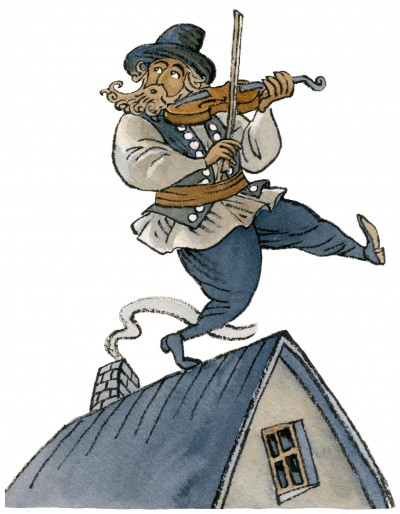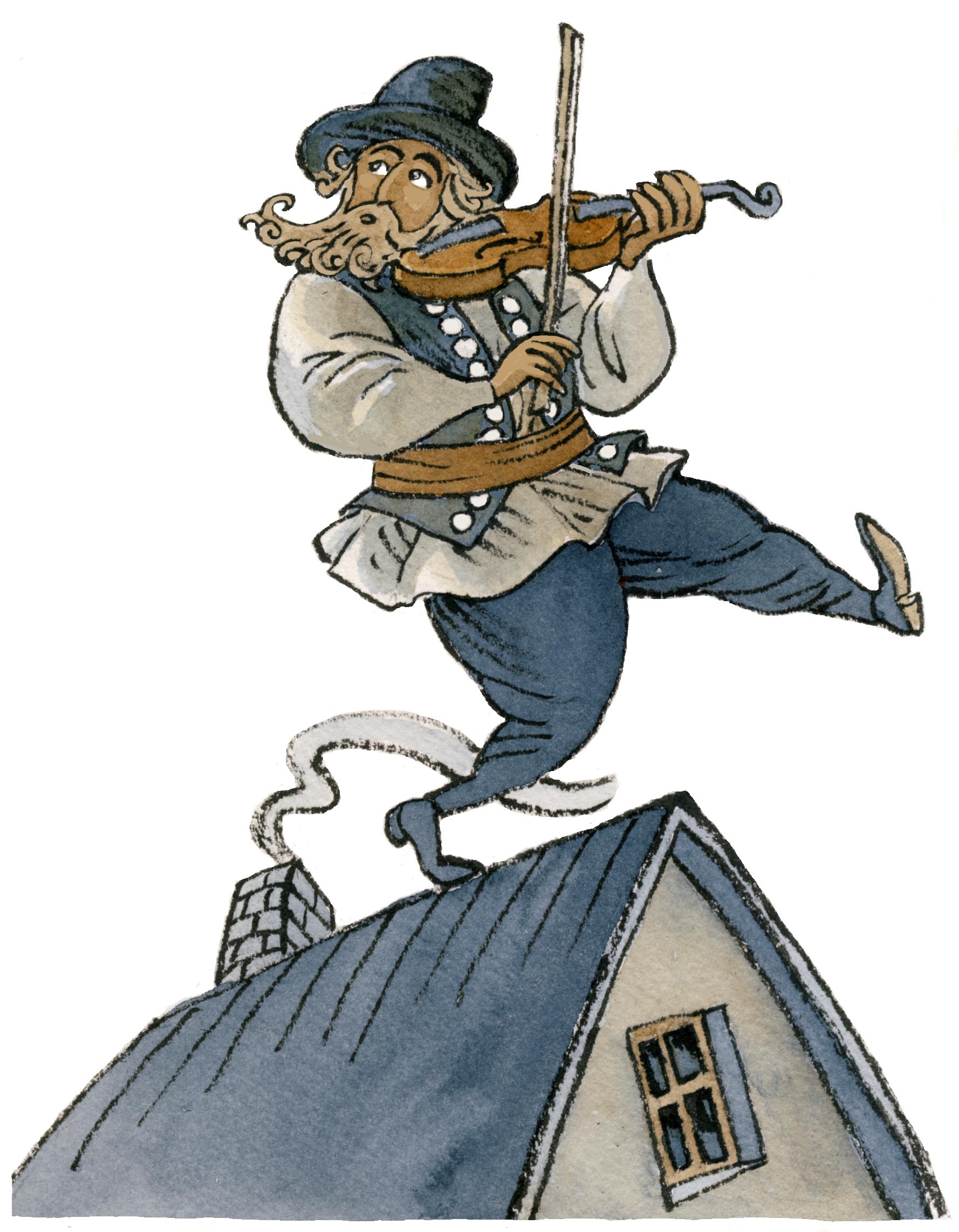
Recently, I participated in one of our people’s most sacred customs: I went to see Fiddler on the Roof. I was psyched. Fiddler has been a part of my life from time immemorial (meaning, I literally cannot remember a time when I did not know it nearly word for word). I’ve seen the movie countless times, I’ve seen the 2004 Broadway revival. I’ve played the Fiddler himself in a high school production. I’ve written a paper about it for a theology course. Fiddler on the Roof has been an indispensable resource for my formation of a Jewish identity in a secular world.
But as I confronted the familiar material for an umpteenth time, I felt compelled to reflect more deeply about the role Fiddler has played, and continues to play, in my identity, to try to answer the question, “What are we doing when watch Fiddler on the Roof?” From such a question comes other questions, among them, “Who are we be-ing when we watch Fiddler on the Roof, and what work does Fiddler do to aid that be-ing?” More than most theatrical productions, Fiddler dares to very self-consciously break the fourth wall, constructing a relationship between performer and audience so intimate, and so essential to the unfolding of the drama, that the very existence of the fourth wall itself is rendered doubtful. Insofar as we are participants in Fiddler’s balancing act, it is incumbent upon us to discern what that participation means, and who it asks us to become.
It is common to construe our relationship (as American Jews) to Anatevka as one of continuity. What I want to focus on, however, are the discontinuities, which are many and somewhat obvious. We are not, by and large, fiddlers in terms of our socio-economic status; few, if any, Jewish watchers of Fiddler are themselves poor milkmen. While we remain political minorities as Jews, an overwhelming proportion of self-identified Jews also self-identify as white, and thereby have gained majoritarian status. We are also in a very different cultural situation, both because American Jews have gained widespread acceptance into American society, and because we generally no longer look to tradition to maintain our balance. The Jews of Anatevka could only be Jewish in Anavtevka, and their Judaism needed to take a particular form in order to ensure some stability in an otherwise precarious situation. Now, we can be Jewish wherever and however we want.
Throughout the musical, tradition is explained in pain-staking detail, in recognition of the distance between their then and our now. Representations of tradition in Fiddler have two functions: One, to evoke nostalgic pride for “the old country” without alienating non-Jewish audiences. Two, to caricature the traditionalist attitudes of Anatevka’s Jews, portraying them as adorably superstitious and pleasantly un-enlightened. As Jewish audience members, we are meant to be proud of our history without feeling compelled to repeat it. Tradition is placed at a safe distance, portrayed as something that our people used to need, but not something we have to cosign in our own time. (It was ironic, for instance, to hear Tevye’s line about head coverings while looking out over a sea of un-covered heads).
But in many ways, Anatevka is portrayed as the natural precursor to our present. Consider an exchange in the final scene: Bielke and Shprintzke are running around as little children do, gleefully making it very clear to the audience that they are going on a train AND a boat (i.e., crossing the ocean to Ellis Island). Golde (who has just been chastised by Tevye for telling “the whole world” that they’ll be staying with Uncle Avram in America, because did they mention they’re going to America?) yells at them, reminding them that “we aren’t in America yet [emphasis mine].” Two important points are made here: One, Tevye’s family is totally absolutely definitely going to America, and thus foreshadowing the transition into the community of our present day. Two, and more importantly, America’s liberalism is juxtaposed against Anatevka’s repressive traditionalism. Anatevka’s quaint traditionalism anticipates life beyond tradition in enlightened America. In Anatevka, people believe in spirits that communicate through dreams; in America, you can run around all you want. These are our grandparents; they keep kosher and speak Yiddish, and we love them for it, but many of us wouldn’t do either ourselves. And we’re okay with that; we prefer to be American-Jews over Jewish-Americans. We don’t want to live in Anatevka anymore, geographically or culturally.
What are we watching when we’re watching Fiddler on the Roof? In a sense, ourselves. Fiddler is neither historical narrative nor faithful representation of a people. It is the pre-history of our present. Though temporally prior, it anticipates that present, and valorizes it. Perhaps that explains its enduring influence on American Jews: Fiddler doesn’t simply tell the story of Anatevka, but presents Anatevka as a prologue to Ellis Island.
I was watching the film with a non-Jewish friend recently (I have a problem, I know) and she asked me why the second act is so depressing. I didn’t have an answer then. But now I do: it isn’t. It isn’t, because we all intuitively know that Fiddler doesn’t end in Anatevka; it ends in West Palm Beach, or Brooklyn, or Chicago. And maybe that’s a good thing. But I wonder how it might be otherwise. What would it look like to experience our past on its own terms, rather than as a prologue to the now? What promises of our past remain unfulfilled? Is the past really ours? And if not, what violence do we do to the memory of the multitude of fiddlers who managed to keep their balance when we claim for ourselves the right to embody their unfulfilled hopes?
Evan Goldstein is a student at Boston College.

